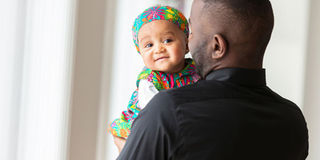How lockdown taught Mugume to love and care for his children

The lockdown has given men an opportunity to spend quality time with their children. FILE PHOTO
What you need to know:
Do this...
- Grow up
“It felt like I was in a barracks. Whenever I attempted to move out, the children would ask me where I was going. I had to adjust and become a listening father. I have had to engage them in playing games, doing exercises and reading books together” Julius Mugume, a taxi conductor.
When Dr David Shengeh, Sierra Leone’s Minister of Education and Chief Innovation Officer, shared a picture of himself carrying his 10- month-old daughter on the back, he became an instant sensation, with several people retweeting, liking and generally commending him for being a hands-on father.
In the explanatory text, the Harvard alumnus explained that during these days of social distancing, he had joined a zoom call, while feeding the infant. He then used a kanga (lesu) to carry the baby on his back and the presentations that were being made via Zoom helped her sleep.
Men such as Dr Shengeh who can comfortably care for a child are rare, as many have been trained to believe that anything domestic is for the female specie.
This explains the initial disorientation for the 45- year-old Julius Mugume, a taxi conductor in Mbarara town. Learning to care for and be comfortable with his children is something he says felt like hell the first few days of the lockdown. Besides losing his daily income of Shs15000, for the first time in 15 years, he had to stay at home with his family.
“The first two days were hell for me, yet the children were very happy and wanted to play with me,” he says.
Mr Mugume says he tried dodging all the requests, including the ice cream and yoghurt, things he easily bought in the past. But the lockdown meant that he had to save every penny that wasn’t going to necessities. As a result, he could no longer be the parent that the children loved for offering treats, now that Mugume had to cut all luxuries out of his family budget.
“To rebuff my children’s demands, I would at times became rude but their mother was always there to quickly call me to order,” he says.
He also attempted to dodge staying at home but the wife and older children already knew he was not working. When he tried to leave home and roam around Mbarara Town, the children asked to accompany him.
“It felt like I was in a barracks. Whenever I attempted to move out, the children would ask me where I was going. I had to adjust and become a listening father. I have had to engage them in playing games, doing exercises and reading books together,” he says.
Mugume says he is now a father that shares parenting roles and responsibilities unlike in the past. “I can now bathe my children and wash clothes with them. I have an opportunity to bond and create meaningful relationship with my children,” says Mugume.
According to Evelyn Kharono Lufafa, a family counsellor, the proceeds for men like Mugume who are now participating in active parenting, won’t just stop at enjoyment. At a time, when domestic violence is on the rise because families are uncomfortable staying together, men participating in the raising of children is good for family cohesion.
“It is a love language. Men and women who share care giving duties have happier relationships,” Lufafa says.
She adds that active parenting, especially for children below 12 years, can create a lifetime bond between children and their fathers. This view is backed by Edith Turyagyenda, another family counsellor, who says sharing parenting roles brings happiness and cements the family bond. She add that children born in families where parents share responsibilities helps them to build healthier relationships in future.
“Active parenting for both mothers and fathers is key in ensuring family stability. These children will learn this attachment, responsibility and replicate it in their future relationships when they are grownups,” says Turyagyenda.
Olive Namaganda, a nurse at Mbarara Regional Referral hospital adds that when men participate in raising children, they learn to support their spouses once life returns to normal.
“As a mother who is at the same time a nurse, I have been working even during lockdown. My husband had to take primary responsibility of caring for children while I was at work,” says Namaganda.
Namaganda says since her husband now has experience in care-giving, it should be easy for him to still do some of it henceforth as opposed to being a passive parent.




